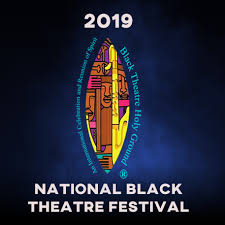

By AARON KRAUSE
WINSTON SALEM, N.C. — Larry Leon Hamlin, the late founder of The National Black Theatre Festival in Winston-Salem, N.C., would likely have described the 2019 event using a favorite word he coined – “marvtastic,” a combination of “marvelous” and “fantastic.”
Indeed, ticket sales were the highest they’ve been in the festival’s 30-year history, according to the Winston-Salem Journal, which quoted festival officials. Further, several shows had sold out before the 2019 event kicked off. Patrons booked hotel rooms earlier than previous years, Marcheta Keefer, Visit Winston-Salem’s director of marketing and communications, told the newspaper.
And while a large portion of festival goers were African Americans, one could also see white people in attendance.
“Black theater is for everyone,” a panelist participating in one of several discussions, told members of the American Theatre Critics Association (ATCA).
The organization’s members were among those attending the festival. This year, ATCA held their annual conference at the festival. Critics saw several of this year’s many plays and musicals. Black theater companies from across the country mounted productions of them. Meanwhile, ATCA members attended a number of panels and its boards discussed various issues.
Speaking of issues and themes, black theater touches on those that are universal. More specifically, it presents “American stories told from an African American perspective,” said one of several panelists partaking in a discussion titled “Living History of the North Carolina Black Repertory Company,” the festival’s producer. It is also the first professional black theater company in North Carolina. Its mission is to “engage, enrich and entertain with innovative programming that resonates across the community and challenges social perceptions,” according to the company’s website.
Hamlin founded the North Carolina Black Repertory Company in 1979. He served as its artistic director. He founded the company nine years before he had the idea to launch The National Black Theatre Festival.
In 1988, Hamlin attended a black theater conference. While there, he concluded that communication between black theater companies could improve. In addition, Hamlin learned that the companies shared problems such as falling short on fundraising. As a result, he launched a conference to bring the various companies together. That conference became the National Black Theatre Festival. He further decided that it would serve as an outreach of his repertory theater company.
Panelists told ATCA members that the festival’s first year featured 17 productions. During the festival’s early stages, fundraising, awareness and marketing were among the challenges. But as the years progressed, the event’s organizers continued to spread awareness, raised funds and garnered support.
Today, some Winston-Salem-area residents take vacations during festival week. For instance, ATCA members learned about a resident who rises at about 5 a.m. each day and volunteers to drive actors around. In addition to transportation, volunteers work in the box office, and other places.
Almost every major black star has attended or acted in the festival, one panelist said. One of those stars is Brian Stokes Mitchell, who performed in the 1992-93 Broadway production of Jelly’s Last Jam.
This year’s festival featured a production of that musical, based on the life of Ferdinand Joseph LaMothe, also known as Jelly Roll Morton. Many might recall this historical character as a musician instrumental in introducing Americans to jazz in the early 20th century.
During opening night of the North Carolina Black Repertory Company’s mounting of “Jam,” Mitchell spoke with college students in the cast. In fact, four original cast members spoke to young cast members, panelists told ATCA members. The panelists added that such motivation and inspiration mark the spirit celebrities impart at the festival.
Clearly, audience members felt inspired during at least three of the productions that comprised this year’s festival.
For instance, Mary Jane McLeod Bethune (1875-1955), an important 20th-century black educator, civil and women’s rights leader as well as government official, moved audience members to sing along to “This Little Light of Mine.”
Bethune (actually Richarda Abrams) appeared in the one-woman show First By Faith: the Life of Mary McLeod Bethune, mounted by New York-based RPR Productions. She entered the stage singing the song, and audience members – black and white – joined in what turned out to be a soulful rendition.
A commanding, enthusiastic Abrams used storytelling and song to chart Bethune’s journey from uneducated child to world-renowned educator and humanitarian.
First By Faith wasn’t the only show which moved audience members to sing, or at least tap their toes. Another was Soul Man, staged by the Sarasota-based Westcoast Black Theatre Troupe.
While this jukebox musical’s plot is noodle thin, the music of iconic 1960s R&B artists made for a rousing evening. Powerful singing voices and fancy footwork from troupe members made this production a powerhouse show from beginning to end.
Talent was also evident at Jelly’s Last Jam. But if you can barely hear the actors singing and speaking, something isn’t right. Nevertheless, expert tap dancing and credible, vivacious performances made this Jelly’s Last Jam electric theater.
The festival featured powerful drama, such as Front Porch Society, a touching, relatable play with plenty of pathos and humor set on the eve of Barack Obama’s election as president. The production by Houston’s The Ensemble Theatre featured first-rate performances.
Ditto for Anne & Emmett, a creatively-written play. In it, playwright Janet Langhart Cohen imagines a meeting in “Memory” between young Holocaust victim Anne Frank and Emmett Till, who was killed by racists in 1955 for whistling at a white woman. This piece, which would work marvelously as, for instance, educational theater for young audiences, featured powerful, believable performances. The two main characters, who seemingly have nothing in common, learn that prejudice against their ancestors has bound them together. They share hope that people will never forget how hate can destroy an entire people and oppress and entire race. But in the play, these young people’s strength of spirit serves as an inspiration to all.
Speaking of inspiration, the National Black Theatre Festival obviously seeks to inspire. And judging by how much it has grown since Hamlin founded it 30 years ago, that is exactly what the festival does.
For more information about the festival, visit https://ncblackrep.org/nbtf-overview/ or call (336) 723-2266.
Meanwhile, for more information about ATCA, the only national association of professional theater critics, visit http://americantheatrecritics.org.


